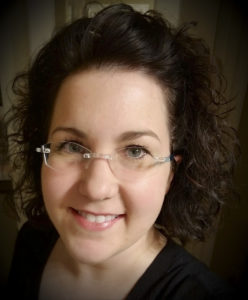NEWS
The trip to make the presentation and pick up the winning hardware was more than 16 hours, counting layovers. And that’s just one way.
But it was worth it.
 Dr. Julie Rutledge, a self-proclaimed “unabashed research nerd” and associate professor of Family and Child Studies in Louisiana Tech’s School of Human Ecology, and director of Tech’s Education and Research in Children’s Health (ENRICH) Center, is co-author of the paper that this summer won the Best Oral Presentation in the Implementation Science Special Interest Group at the International Society of Behavioral Nutrition and Physical Activity (ISBNPA) Annual Meeting in Prague, Czech Republic.
Dr. Julie Rutledge, a self-proclaimed “unabashed research nerd” and associate professor of Family and Child Studies in Louisiana Tech’s School of Human Ecology, and director of Tech’s Education and Research in Children’s Health (ENRICH) Center, is co-author of the paper that this summer won the Best Oral Presentation in the Implementation Science Special Interest Group at the International Society of Behavioral Nutrition and Physical Activity (ISBNPA) Annual Meeting in Prague, Czech Republic.
The paper’s other authors are Rutledge’s research partner Taren Swindle from the University of Arkansas for Medical Sciences and Susan Johnson, Swindle’s mentor and an internationally known and respected researcher in child nutrition at the University of Colorado, Denver on the Anschutz Medical Campus.
The paper is based on work both Rutledge and Swindle are doing in Lincoln Parish and across Arkansas with funding through both the Lincoln Health Foundation and the National Institutes of Health (NIH). Already through their combined efforts, the program the two started and implemented in 2014 — We Inspire Smart Eating, or WISE — is now active in 50 counties in Arkansas and serves more than 600 children a year in Lincoln Parish.
“We are incredibly grateful for both the local and federal support we’ve received,” Rutledge said. “We are in the process of writing an R01 — these are usually bigger grants that last four or five years — that will expand WISE to over 200 more schools across Louisiana and Arkansas.”
All the work is done through Tech’s ENRICH Center, established to enrich the lives of children by investing its resources in both their early development and in the important adults in their lives — their teachers and parents.
The paper that won the award this summer is about the process that Rutledge and Swindle used to create a new program they are doing with teachers in 26 classrooms this fall, the WISE Words Program. Creating it involved panels in Arkansas and Louisiana made up of early childhood educators (ECEs), early childhood program administrators, parents of preschool-age children, and the Rutledge/Swindle research team. The panels’ goal was to end with a program that focuses on supporting evidence-based (research and best practices-based) feeding practices for early childhood educators (ECEs).
Rutledge and Swindle then created and tested a pilot program, and then received the panels’ feedback about how it worked.
“From that, we modified the program and are starting it this year in Lincoln Parish; we held training this summer,” Rutledge said.
So the WISE nutrition program that is done with children each week in the classroom to increase their exposure to fruits and vegetables. The WISE Words Program focuses on helping teachers work on goals related to improving their feeding practices with children, especially related to what they say during mealtimes.
“We also hope that children getting excited about what they are doing through WISE at school results in them going home and talking to their parents about it,” Rutledge said. “As part of that, they are asking their parents to buy the fruits and vegetables that they are learning about and trying at school through our program and to make the recipes that they make at school. Pester Poweris the research term for what we hope the children are doing — the powerof children pesteringtheir parents to buy and make recipes with the WISE target fruits and vegetables at home even though they learn about them at school.”
Rutledge and Swindle met in graduate school at Oklahoma State University and reconnected at a conference in 2014. By June of that year, they’d written a grant for their WISE idea, received funding, and have been working together since.
Peyton Percle (BS Family and Child Studies ’15, MA Clinical Health Counseling ’17),who contributed to the research, began working in Rutledge’s research lab as an undergraduate and worked two years after graduation as a Research Associate with Rutledge.
“She recently moved back home to New Orleans but is still working in a consultant and writing capacity for us,” Rutledge said. “If we get the R01 grant that we’re submitting in this fall, we hope she will be able to re-join the team.”
This fall Rutledge is teaching both Research Methods in Family and Child Studies, and Early Childhood Development, two of her favorite classes because “I love sharing my passion for research and all of the ways you can use it and conduct it with our students,” she said. “And Early Childhood Development is the age range where all of my training and research come together, and I love helping students learn about all of the fascinating developmental changes that happen during that time.
“Plus we have our Early Childhood Education Center on campus with Director Laura Chestnut and Lead Teacher Shannon Tatum,” Rutledge said, “where preschoolers get to experience school for the first time and our students get to gain real-world, hands-on experience under two experts in early childhood education.”